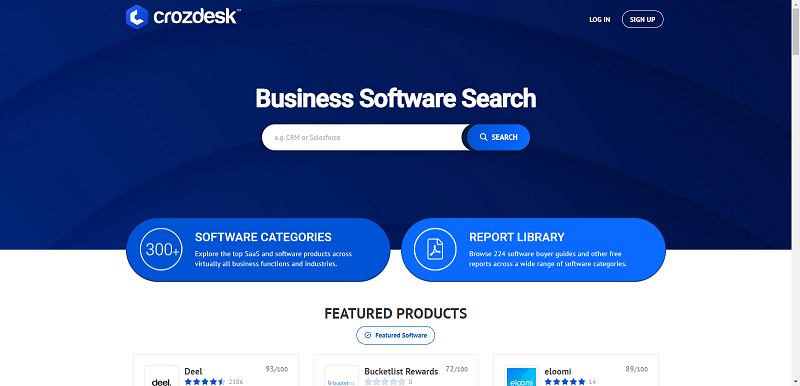Cloud computing is gaining popularity since last few years. It is a computing model that uses shared infrastructure to provide computing resources to companies dynamically over a cloud, such as internet. It enables companies to use data storage, software applications, and computer processing power owned and maintained by cloud service providers through the internet or proprietary network of the service provider.
The cloud computing services are broadly divided into three categories:
1. Infrastructure-as-a-Service (IaaS)
2. Platform-as-a-Service (PaaS)
3. Software-as-a-Service (SaaS)
Alternatively, some providers use some different nomenclature, e.g. Hardware-as-a-Service (HaaS) for IaaS and only SaaS for later two categories.
Cloud computing allows enterprises and small businesses to user a shared infrastructure as a service. It brings freedom from maintaining and configuring local servers by allowing the usage of distributed servers and computers maintained and configured by cloud computing Service Providers. These service providers are essentially well equipped and capable of operating distributed computing infrastructure than a small business or enterprise that does not specialize in IT infrastructure and services thereby allowing them to concentrate on their core business.
The cloud also allows companies to use the computing resources as needed by making them a service. For example, a retail business that requires more computing resources say the number of servers for certain months of a year due to the high volume of business while its needs drop to a few servers for the rest of the year. By using cloud from a cloud service provider, such retail business can save capital investment that remains idle most the year.
The same is true about ‘Software as a Service’ (SaaS) provided by cloud computing providers. Companies can purchase monthly or quarterly subscriptions instead of purchasing complete license and become worry free from its becoming obsolete in a few months or a year. Traditionally, newer versions of software require companies to purchase them again, and sometimes these newer versions also need enhanced infrastructure due to added functionalities, and thus add up to investments in infrastructure. cloud services, both infrastructure and software allow companies to cut cost on repurchase of newer versions and upgrading of infrastructure.
How Companies Benefit from Cloud Computing
Companies can readily benefit from cloud computing. Some of the benefits cloud offers to companies are:
1. Time to start using the infrastructure and services is significantly reduced. Since cloud providers can extend services quickly, companies do no longer need lead time for bidding, purchasing, installation, and configuration of hardware and software
2. Costs on software licensing are reduced as companies can use online services in the cloud
3. Companies no longer need dedicated human resources for IT infrastructure and thus save administrative costs
4. Since cloud service providers specialize in infrastructure and software, they can offer more availability and reliability than a small in-house IT team could provide
5. Companies no more need to maintain their servers. This reduces maintenance cost
Cloud computing also helps companies to benefit from online services like unified communications services and collaboration that improves productivity and reduces the cost on travel and meetings. Microsoft SharePoint, Google Cloud Platform, Microsoft Online Services Business Productivity Suite, etc. are a few examples of collaboration platforms that can be used by companies with a monthly subscription without having to purchase software licenses. Some cloud vendors also offer free upgrades to latest hosted software versions.
Cloud to Test Network Configuration
Testing of network equipment configuration is one of the expensive exercises for small and medium sized companies. Cloud computing offers a solution to testing the network equipment configuration with little cost. Traditionally, the network administrators required to build smaller scale test labs replicating their network and test out their network configuration changes before actual roll out. Building a test lab is quite expensive, and the test equipment is rarely used after completion of testing. The cloud computing has resolved this problem and now the expensive network equipment can be leveraged more efficiently by virtue of cloud computing services. Network administrators can request network equipment remotely through a GUI or web services interface, build, configure, and test the configuration without having to invest into building a test lab physically.
Issues Preventing Cloud Computing from Becoming Pervasive
Although cloud computing offers a lot of benefits, yet it is not being viewed as final solutions to IT needs of every company and enterprise.
Cloud computing is not equally beneficial for every business; rather it depends on company needs. There are still some concerns relating to privacy and security of data through cloud providers guarantee both security and privacy of the data through service level agreements and enormous penalties in case of any breach. However, a company with large proprietary data may it uncomfortable to place it in facilities that are not directly under its own control.
The other issues relate to availability and reliability of network that is operated and maintained by telecommunication service providers.
These issues make cloud computing ideal for small to medium enterprises that do not have well established and constant need of infrastructure and software, and it fluctuates with time during a year making it impossible for them to invest in a large infrastructure that is used for shorter duration in a year.
By Krishan Lal Khatri,
Krishan is a technology researcher and writer with over 12 years experience in telecommunication industry. He has a masters degree in Electronic Engineering and is member of IEEE and ISOC. He has worked with leading telecommunication service providers in Pakistan and United Arab Emirates for 10 years and then switched to teaching and research by joining a public sector university. He is currently pursuing PhD in Electrical Engineering.





